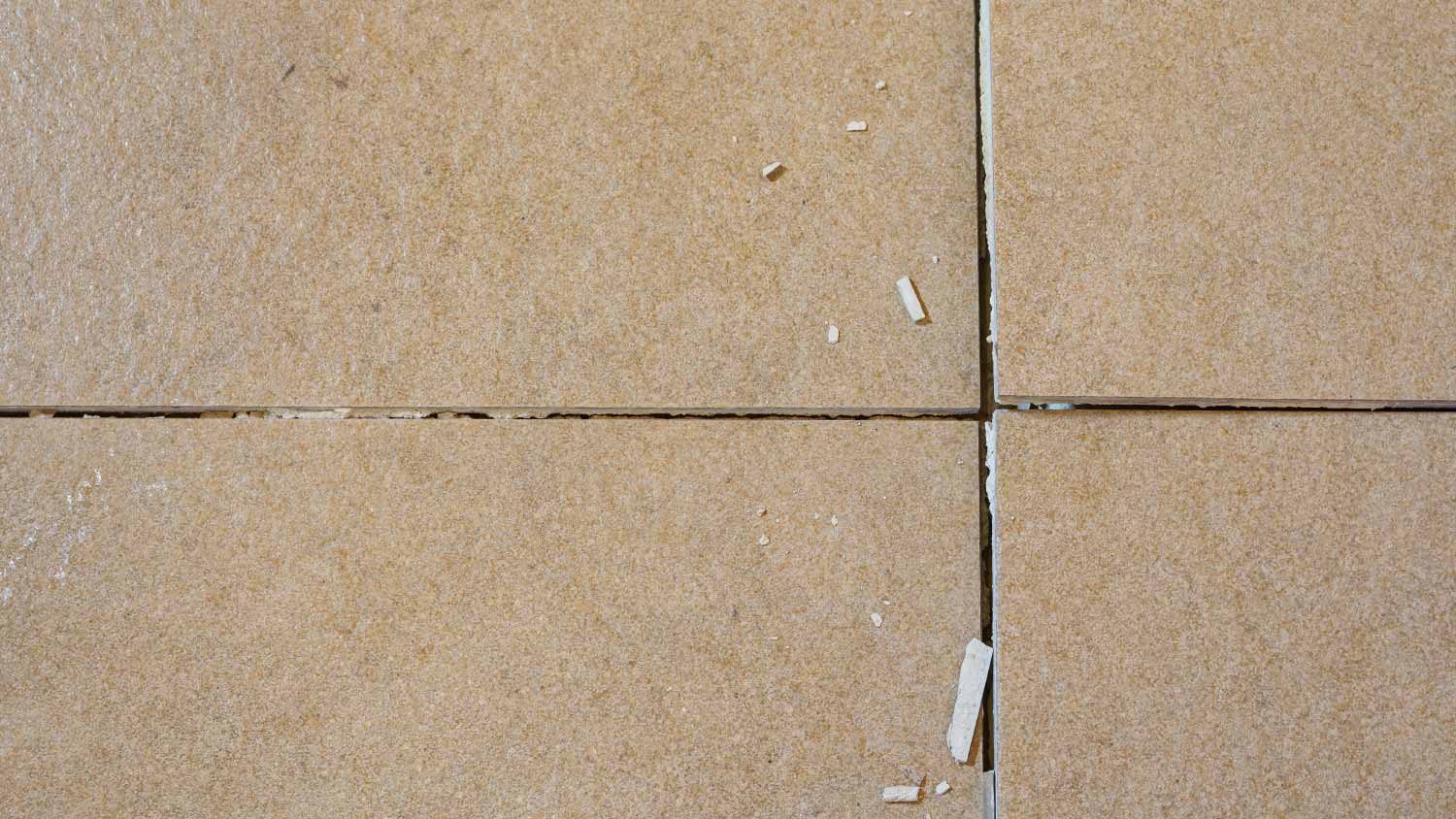
Damaged tiles should be fixed right away. In this guide, find out all of the different factors that affect your tile repair cost.
Figure out the cause of your crumbling grout


Grout can crack for multiple reasons, including poor installation and movement.
Concrete-based grout can crack if it’s unsealed or improperly sealed.
Normal wear and tear can make cracks appear in grout.
Without treatment, cracked grout can lead to water damage, mold, and other issues.
You can fix minor cracks with caulk, but widespread cracking may require regrouting.
Cracked grout doesn’t just look bad; if ignored, damaged grout can actually lead to bigger problems that are harder (and more expensive) to repair. So, why does grout crack in the first place? Here are some of the most common causes, as well as tips for preventing and fixing cracked grout.

In many cases, cracked grout is the result of incorrect grout or tile installation. This can occur for a number of reasons, including:
Lack of adhesive: If you or your installer didn’t apply enough tile adhesive when laying a tile wall or floor, the tiles can start to pull away from the underlying surface. This creates air gaps beneath the tiles and puts more stress on the grout, which can eventually crack or crumble.
Improperly mixed grout: Similarly, if you used too much water or additives when mixing the grout, air pockets can form in the grout. Over time, this can weaken and break the grout. This is a common culprit in cases where brand new grout is cracking.
Early exposure to water: Cracks can also develop if water gets onto the grout before it’s fully dry. Grout drying times vary by product, but generally speaking, you should wait 24 to 72 hours before letting the grout get wet.
It’s natural for your home to move slightly, whether due to the foundation settling, changes in temperature, fluctuations in humidity levels, and other factors. When this happens, cracks can appear in your grout—particularly in joints where tile meets another surface.
For instance, if you have a tile wall above your bathtub, you might notice cracks in the joints where the tile connects to the tub. Movement in your subfloor can also lead to cracked grout.
While you can’t stop your home from moving, there are ways to minimize the risk of grout cracking. When you hire a tile installer, for example, they’ll leave a certain amount of space around the perimeter of your project to allow for expansion and contraction. They’ll also know when to use caulk versus grout to prevent cracking.
You don’t need to seal all types of grout, but cement-based grout requires sealing. If not, this porous grout can absorb liquid, leaving it susceptible to cracking. Improper sealing can also lead to other problems, like staining, mold growth, and water damage.
Regularly resealing grout can help prevent these sorts of issues. You can seal most types of grout every two years, but shower grout should be sealed annually.

Sometimes, cracked grout is simply a matter of wear and tear. As grout gets older, it’s more likely to break down and crack—especially if it’s in an area with heavy foot traffic.
The right method for fixing cracked or loose grout depends on a few factors, including the extent and cause of the damage.
If you only have a couple of cracks here and there, you may be able to fill them in with silicone caulk. However, if there’s widespread fracturing or crumbling, you may need to replace the grout (or tile) entirely.
Either way, it’s smart to have a local grout repair pro assess the situation before trying to fix it yourself.
In some cases, repairing cracked grout is a DIY-friendly job that you can finish in an afternoon. However, you should only take on this project if you can identify—and are prepared to fix—the underlying problem that led to the grout cracking. Otherwise, you could end up with the same problem down the line. If you aren’t sure what’s causing your cracked grout, call a pro.
Repair costs vary depending on the type of grout and the size of the area, but you can often spot-fix minor cracks for around $50. On the other hand, hiring a pro to repair grout costs $100 to $700.
For more severe or widespread cracking, you may need to replace the grout—which is pricier (and far more labor-intensive) than fixing a few spots. For example, you can regrout a shower yourself for about $200. But if you’d rather leave it to an expert, enlisting a professional to regrout a shower costs $600 to $2,500.
From average costs to expert advice, get all the answers you need to get your job done.

Damaged tiles should be fixed right away. In this guide, find out all of the different factors that affect your tile repair cost.

Whether it’s on your floor, walls, or shower, ceramic tile can add style to your space. So, how much does ceramic tile installation cost? Let’s break it down.

The cost to install porcelain tile depends on materials, size, and whether you DIY or hire a pro. This guide will help you choose the perfect porcelain tile for your home and budget.

If you’re unsure how to mix grout, take a deep breath and follow our guide. You’ll learn the simple steps to a peanut-buttery grout with the strength to last for decades.

Prevent damaging expensive material by knowing how to cut glass tile. Learn the four methods and the tools you’ll need with this guide.

Can you tile over tile? Yes—if you prep right. Learn how to prep, choose adhesive, and avoid common mistakes for a successful tile-over-tile project.